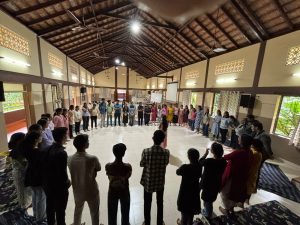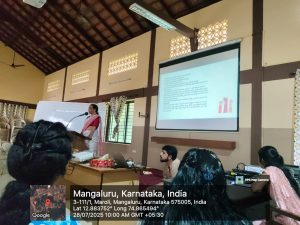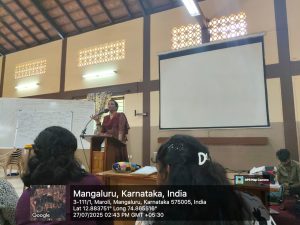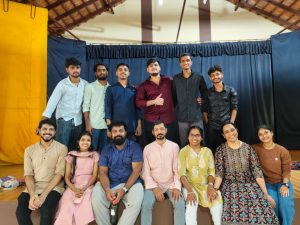NSS volunteers participated in the Samvada Workshop 2025, organized by Samvada’s Youth Resource Centre (YRC), Mangaluru from 24th to 28th July 2025.
Day 1: Understanding Self and Society: The Samvada Workshop began on May 24, 2025, at Shanti Kiran Hall, Bajpe, with the theme “Self-Awareness – Social Analysis.” Through films, poems, and group activities, participants explored how personal values relate to social issues. A short film on rape culture and a Kannada poem titled “Die Slowly” helped start conversations on violence, change, and living fully. Activities encouraged students to think deeply about how society shapes their views and the importance of questioning harmful social norms.
Day 2: Caste, Class, and Gender: Day two included sessions by experts like Kishore Attavar, who discussed caste, religion, and social inequalities, linking them to constitutional rights. A powerful film, “Vande Mataram”, highlighted the struggles of manual scavengers, followed by a discussion on poverty myths. An activity on hospital planning revealed unconscious social biases. The day ended with a session on gender sensitivity, focusing on discrimination in language, history, and everyday life, led by Manjula K.
Day 3: Environment and Equality: Day three started with a game showing how competition for resources affects society. Topics like equality vs equity and reservation policies were discussed. Akash Kudla, an environmental activist, shared alarming statistics about deforestation, water usage, and harmful development projects in Dakshina Kannada. He stressed the need for public involvement in protecting the environment. Later, a session on religion and pluralism encouraged open-minded thinking and respect for all beliefs.
Day 4: Advocacy and Empowerment: The final day focused on youth advocacy and speaking up for justice. Participants debated tough questions like capital punishment and learned that real change begins with self-awareness. A powerful drama on sexual abuse performed by Pavithra showed the silence forced on victims and called for a society that supports survivors. The workshop ended with cultural performances, feedback, and certificate distribution, leaving students with a message of empowerment, awareness, and action.



